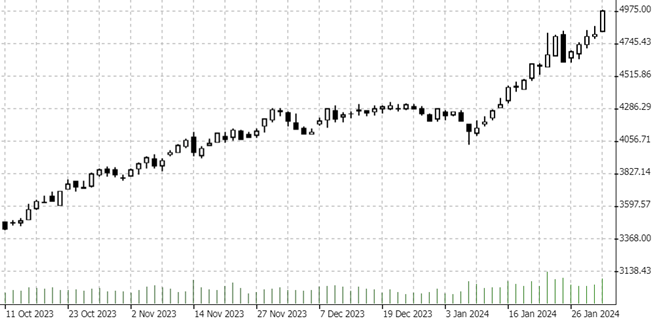

02.02.2024 – The bull run in cocoa is slowly becoming scary: the chart looks like a launch pad. There is already talk of a “parabolic rally” – which means that the upward trend could become even steeper. The current fuel for the price rocket is rising from the Sahara.
Cocoa is unstoppable. We hope you entered on the long side weeks ago after our intensive reporting. Here is the daily chart. Of course, nothing lasts forever. But the latest news should also please the bulls.

Source: Bernstein Bank GmbH
The news site “Barchart.com” has just reported a 46-year high for the nearby futures contracts in New York – and even an all-time high in London. It was also the site that spoke of a “parabolic rally”.
Hot trade winds
The current reason for the buying panic is therefore the “Harmattan”. Here is the background from spektrum.de: “Harmattan, dry, hot wind blowing predominantly from the north-east in the Sahara and the southern peripheral areas. This wind, often laden with red sand from the desert, blows from the northern horse latitudes towards the equator and thus represents part of the trade wind.”
For cocoa, this means that the harvest could be in danger. Barchart.com stated that the hot wind is currently more extreme than average, drying out the plantations and reducing the mid-crop in April. This is further reducing global supply.
Tighter supply
At the beginning of the week, Côte d’Ivoire also reported the delivery of around 1.0 million tonnes of cocoa from farmers to the ports for the period from 1 October to 28 January – a drop of 36 per cent compared to the previous year in this period. In the previous week, the Ivorian regulatory authority Le Conseil Cafe-Cacao had also stopped forward sales for the 2024/25 season. The authority first wanted to gain a precise overview of the supply situation in the world’s largest cocoa producer.
The conclusion from all of this is that it is possible that Ivorian smallholders are increasingly smuggling goods across the border because they can achieve higher prices there – and thus distort the figures from Côte d’Ivoire. However, it would take a few supply surprises to break the current trend. This is because the hot Sahara wind is an additional factor in the supply shortage, alongside the viral disease CSSD (Swollen Shoot Disease) and the fungal disease Black Pod Disease. As the global population continues to grow unchecked, demand is also increasing. We will continue to keep an eye on the market situation for you and wish you successful trades and investments!
__________________________________________________________________________________________________________________________________________
The content of this publication is for general information purposes only. In this context, it is neither an individual investment recommendation or advice nor an offer to purchase or sell securities or other financial products. The content in question and all the information contained therein do not in any way replace individual investor- or investment-oriented advice. No reliable forecast or indication for the future is possible with respect to any presentation or information on the present or past performance of the relevant underlying assets. All information and data presented in this publication are based on reliable sources. However, Bernstein Bank does not guarantee that the information and data contained in this publication is up-to-date, correct and complete. Securities traded on the financial markets are subject to price fluctuations. A contract for difference (CFD) is also a financial instrument with leverage effect. Against this backdrop, CFD trading involves a high risk up to the point of total loss and may not be suitable for all investors. Therefore, make sure that you have fully understood all the correlating risks. If necessary, ask for independent advice. CFDs are complex instruments and are associated with the high risk of losing money quickly because of the leverage effect. 68% of retail investor accounts lose money trading CFD with this provider. You should consider whether you understand how CFD work and whether you can afford to take the high risk of losing your money.7
